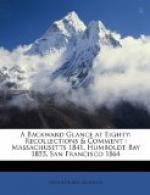In October, 1849, there were at Rich Bar forty miners short of provisions and ready for any adventure. The Indians reported that eight suns to the west was a large bay with fertile land and tall trees. A vision of a second San Francisco, a port for all northern California, urged them to try for it. Twenty-four men agreed to join the party, and the fifth of November was set for the start. Dr. Josiah Gregg was chosen leader and two Indians were engaged as guides. When the day arrived the rain was pouring and sixteen of the men and the two guides backed out, but the remaining eight were courageous (or foolhardy) and not to be thwarted. With a number of pack animals and eight days’ supplies they started up the slippery mountainside. At the summit they encountered a snowstorm and camped for the night. In the morning they faced a western view that would have discouraged most men—a mass of mountains, rough-carved and snow-capped, with main ridges parallel on a northwesterly line. In every direction to the most distant horizon stretched these forbidding mountains. The distance to the ocean was uncertain, and their course to it meant surmounting ridge after ridge of the intervening mountains. They plunged down and on, crossed a swollen stream, and crawled up the eastern side of the next ridge. For six days this performance was repeated. Then they reached a large stream with an almost unsurmountable mountain to the west. They followed down the stream until they found it joined another of about equal size. They had discovered the far-flowing south fork of the Trinity. They managed to swim the united river and found a large Indian village, apparently giving the inhabitants their first view of white men. The natives all fled in fright, leaving their camps to the strange beings. The invaders helped themselves to the smoked salmon that was plentiful, leaving flour in exchange. At dusk about eighty of the fighting sex returned with renewed courage, and threateningly. It took diplomacy to postpone an attack till morning, when powder would be dry. They relied upon a display of magic power from their firearms that would impress superior numbers with the senselessness of hostilities. They did not sleep in great security, and early in the morning proceeded with the demonstration, upon which much depended.
When they set up a target and at sixty yards pierced a scrap of paper and the tree to which it was pinned the effect was satisfactory. The Indians were astonished at the feat, but equally impressed by the unaccountable noise from the explosion. They became very friendly, warned the wonder-workers of the danger to be encountered if they headed north, where Indians were many and fierce, and told them to keep due west.




